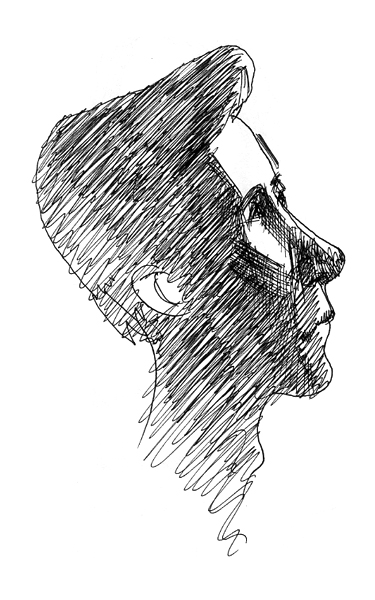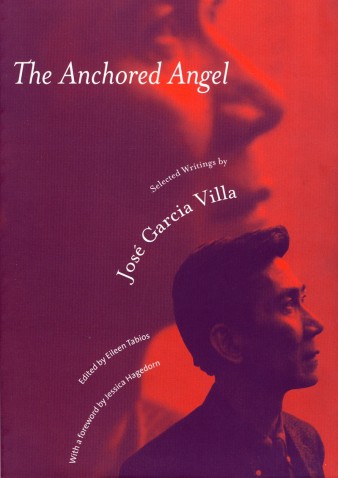José Garcia Villa
Jose Garcia Villa was born in Manila, Philippines, in 1908, and emigrated to the United States in 1929. He received a bachelor’s degree from the University of New Mexico in 1932, then moved to New York for graduate study at Columbia University. Scribner’s published a collection of stories called Footnote to Youth in 1933. In 1933, Villa dedicated himself exclusively to poetry and the experimental opportunities poetry promised. His first collection,Have Come, Am Here, was published in 1942 by Viking, and won the American Academy of Arts and Letters Award. His next book,Volume Two, was published in 1949 by New Directions, where he served as associate editor from 1949-1951. He went on to publish two more volumes of poetry in the United States —Selected Poems and New (1958: McDowell, Obolensky) and Appassionata (1979: King and Cowen) — and a number of books in the Philippines.
His awards and honors include a Guggenheim Fellowship (1942), Bollingen Foundation Fellowship (1951-52), Shelley Memorial Award (1958), Philippines Pro Patria Award (1961), Philippines Cultural Heritage Award (1962), and Rockefeller Foundation Fellowship (1963). He was appointed Presidential Adviser on Cultural Affairs by the Philippine government in 1968 and elected Philippines National Artist in 1973.
In the Philippines, Villa became the arbiter of literary taste in the growing body of English language work being produced. He taught poetry at City College and the New School, and held private poetry workshops in his Greenwich Village apartment. Villa died on February 7, 1997 in New York City.
books
The Anchored Angel: Selected Writings
The Anchored Angel: Selected Writings by José Garcia Villa reintroduces the work of the celebrated writer to the United States. At the height of his career, Villa’s writings earned him prizes, fellowships, and lavish praise from some of the greatest literary luminaries of the day. Yet his work has been out of the public eye for more than thirty years and out of print for more than fifteen. Although named a National Artist in the Philippines where he was born, Villa remains largely unknown in the United States today.
Kaya’s republication of Villa’s writings both recovers and rediscovers the work of this fierce iconoclast for a new generation. Included are reprints of his major poems and representatives from each of his significant experiments, as well as short stories and non-fiction work. Edited by acclaimed author of Black Lightning: Poetry-in-Progress, Eileen Tabios, Kaya’s collection includes essays by contemporary Filipino and Filipino American writers Luis Cabalquinto, Nick Carbó, Jonathan Chua, Luis Francia, Nick Joaquin, E. San Juan, and Alfred Yuson, and a foreword by Jessica Hagedorn.
praise
“The Anchored Angel is a marvelous reintroduction to the work of one of the greatest pioneers of Asian American literature. For José Garcia Villa was our bitter, narcissistic angel of both late Modernism and early post-colonialism, an inventive, luminous intelligence full of sweet song and possessed of an unforgettably unique, bilious presence of a legend. Like the César Vallejo of Trilce, Villa could be abstract, elusive, eccentric, yet capable of a lyric passion so intense, both heart and throat ache to intone his strophes. Editor Eileen Tabios and the contributing essayists have accomplished a literary treasure, an archive, and a clear-eyed act of literary homage to an important figure in twentieth-century world poetry.”
— Garrett Hongo, author of Volcano: A Memoir of Hawai’i
“Mr. Villa seems to me to possess one of the purest and most natural gifts discoverable anywhere in contemporary poetry. This accounts for his power to say, quietly, the most astonishing and exalted things.”
— Mark Van Doren
“Depth is not the fashion, and even the well-disposed reader may startle at certain paradoxical avowals in these bravely deep poems by José Garcia Villa. A new poet, a young native from the Philippines, this author; and his work is for the most part new to print, but final wisdom encountered in poem after poem merely serves to emphasize the disparity between tumult and stature.”
— Marianne Moore, from a review of Have Come, Am Here
“and i am alive to see a man against the sky”
— e. e. cummings
“A poet with a great, even an astonishing, and perfectly original gift.”
— Dame Edith Sitwell


